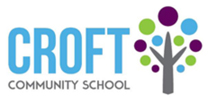Mathematics is essential for everyday life, for understanding and engaging with our world. It enables the development of pupils’ natural ability to think logically, solve puzzles and apply these skills to real-life problems. Pupils learn to think creatively and make links between mathematical concepts through exploring patterns in the number system, shape, measures and statistics. They make and discuss propositions, explaining their reasoning and justifying their answers. At Croft Community School pupils develop the skills, knowledge and efficient methods of calculation necessary to support their economic future and problem solving in daily life. Maths skills are a key element of preparing our pupils to have the confidence and resilience to make a successful transition to college or the world of work.
By following a spiral curriculum, pupils at Croft are able to revisit a topic or area several times throughout their school career. The complexity of the topic increases with each revisit but new learning always has a relationship with old learning and is put into context for our pupils. This is made explicit to pupils at Croft Community School through the use of our ‘recap, present, apply, review’ lesson structure. We believe the benefits of teaching in this way are that information and learning are reinforced and underpinned each time the pupil revisits the topic. This allows a logical progression from simplistic ideas to more complex ideas. Pupils are encouraged to truly have mastery of concepts before exploring more complex ideas. Furthermore, pupils are encouraged to apply their early learning to later objectives.
At Croft Community School, problem solving is at the heart of mathematical learning and teaching. We encourage pupils to develop the resilience and tenacity to solve problems and through effective teaching provide pupils with the tools to overcome these difficulties. Towards the end of each Maths topic, our pupils have the opportunity to self-reflect on the skills, knowledge and understanding that have been learnt during the topic. Pupils are also encouraged to be able to work both independently and collaboratively and to communicate effectively with others, showing patience and empathy.
Maths lessons at Croft promote oracy through ‘maths chat’; it means pupils are constantly articulating their mathematical thinking and reasoning. Through discussion, pupils develop deeper understanding of the maths they are learning. We believe that oracy is important in the maths classroom, as it gives pupils the chance to explore and verbalise their ideas, and to develop their thinking. It also gives teachers the chance to assess what pupils know and understand, enabling them to quickly address misconceptions or gaps in learning.
At Croft we promote that the teaching of and enthusiasm for Mathematics must not be confined to Maths lessons. We have identified four key Numeracy skills which should be embedded across the curriculum; times tables, measure, time and money. There are many other Mathematical skills which lend themselves well to other subject areas and staff are encouraged to identify these when delivering their own subjects, as appropriate. Maths learning at home is encouraged through the use of ‘Mathletics’.

curriculum and accreditation offer at the end of Key Stage 4. Achievements in Maths also contribute to pupils ASDAN and Duke of Edinburgh Awards where appropriate. We strive to ensure all pupils make progress and achieve to the best of their ability in Maths, whilst building passion for and enjoyment of the subject.
At Croft Community School we celebrate Maths through assembly awards linked to our school values, STEM days and in class competitions. We have an ambitious
